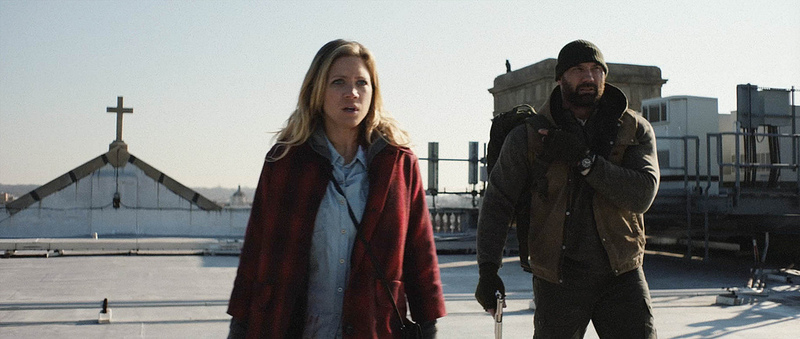
Sundance Film Review: Bushwick
Film Reviews
Bushwick
Sundance Film Festival
Directors: Cary Murnion & Jonathan Milott
From Children of Men to True Detective, I’m a complete sucker for a continuous steadycam shot. Indeed, it’s the first thing that I noticed as I watched an unassuming New York couple Lucy (Brittany Snow) and Jose (Arturo Castro) walk across a subway platform on the way to visit Lucy’s grandma. It doesn’t take long for Bushwick’s visceral action to kick in—after about five minutes of everyday routine, our characters are thrust into a deadly conflict that is raging across Brooklyn. It’s not until Lucy meets up with Stupe (Dave Bautista), a military veteran, that she even begins to stand a chance.
We’ll get to the performances in a moment—there’s plenty to talk about there. The reason you’re going to want to see this movie is because of cinematographer Lyle Vincent. Thanks to his careful hand and ability to frame shots seemingly on the fly, the audience plunges into the back alleys and sub-basements of Brooklyn’s Bushwick neighborhood. We’re peeking through windows, ducking ominous soldiers dressed in black and, eventually fighting alongside the neighborhood’s residents as they struggle to reclaim their streets. It’s a technique that Vincent maintains throughout the film, making the whole story unfold as if it is happening in real time.
The cinematography also serves to bring the screenplay, written by Nick Damici and Graham Reznick,to frightening life. Bushwick’s story presents a cold-blooded revival of the American Civil War as secessionist soldiers attempt to establish a beachhead in Brooklyn as part of a plan to make the federal government take them seriously. We learn that the secessionists chose the Bushwick neighborhood in particular because of its high level of ethnic diversity which presented a “soft spot” as one soldier puts it. The result is a brutal street battle that finds gang members teaming up with clergy in order to dispel the white nationalists at their doorsteps.
From the acting standpoint, Bushwick has a few hits and misses. On an individual level, both Snow and Bautista offer solid performances. Snow makes an admirable transition from helpless grad student to ruthless street warrior, and Bautista gets a rare opportunity to express vulnerability in between cracking skulls. Despite their solo work in Bushwick, the pair struggle when they’re onscreen with one another. The archetype of the platonic tough guy and lost girl is great when it’s done effectively, but Snow and Bautista run into problems when they’re supposed to be acting cooperatively.
While Bushwick’s appeal exists because of its intensity, it is also a film in desperate need of comic relief. It’s something that the filmmakers took a stab at—Angelic Zambrana’s role as Lucy’s pot-addled sister gives the audience a bit of a break in between tense gunfights and bone-crushing melees—but it doesn’t quite get the job done.
Outside of a few missteps, it’s truly epic to watch a small neighborhood full of marginalized Americans take up arms against an army of whack-job secessionists. The scenes in which we see a diverse group of everyday citizens fight for their homes become especially poignant within the scope of our current political climate. Seeing Brooklyn shelled by our own weapons and seeing Americans gunned down in the street is a haunting reminder of the many international cities that have been ravaged by civil war. In contrast, Bushwick also reminds us that the human spirit is resilient, and that people fight hardest when they have something to lose. –Alex Springer